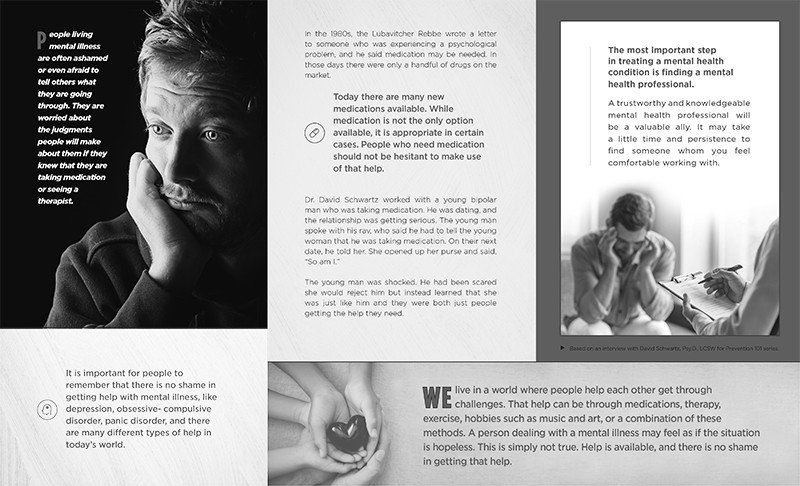David Schwartz, Psy.D., LCSW has been a professional counselor for 40 years. David focuses on evaluation, prevention, diagnosis, and treatment of mental, emotional and behavioral health issues.
People living with mental illness are often ashamed or even afraid to tell others what they are going through. They are worried about the judgments people will make about them if they knew that they are taking medication or seeing a therapist. It is important for people to remember that there is no shame in getting help with mental illness, like depression, obsessive-compulsive disorder, panic disorder, and there are many different types of help in today’s world.
In the 1980s, the Lubavitcher Rebbe wrote a letter to someone who was experiencing a psychological problem, and he said medication may be needed. In those days there were only a handful of drugs on the market. Today there are many new medications available. While medication is not the only option available, it is appropriate in certain cases. People who need medication should not be hesitant to make use of that help.
Dr. Dovid Schwartz worked with a young bipolar man who was taking medication. He was dating, and the relationship was getting serious. The young man spoke with his rav, who said he had to tell the young woman that he was taking medication. On their next date, he told her. She opened up her purse and said, “So am I.” The young man was shocked. He had been scared she would reject him but instead learned that she was just like him and they were both just people getting the help they need.
The most important step in treating a mental health condition is finding a mental health professional. A trustworthy and knowledgeable mental health professional will be a valuable ally. It may take a little time and persistence to find someone whom you feel comfortable working with.
We live in a world where people help each other get through challenges. That help can be through medications, therapy, exercise, hobbies such as music and art, or a combination of these methods. A person dealing with a mental illness may feel as if the situation is hopeless. This is simply not true. Help is available, and there is no shame in getting that help.
Prevalence Of Mental Illness
Approximately 1 in 5 adults in the U.S.—43.8 million, or 18.5%—experiences mental illness in a given year
Approximately 1 in 25 adults in the U.S.—9.8 million, or 4.0%—experiences a serious mental illness in a given year that substantially interferes with or limits one or more major life activities.=
Approximately 1 in 5 youth aged 13–18 (21.4%) experiences a severe mental disorder at some point during their life. For children aged 8–15, the estimate is 13%.
18.1% of adults in the U.S. experienced an anxiety disorder such as posttraumatic stress disorder, obsessive-compulsive disorder and specific phobias.7
Among the 20.2 million adults in the U.S. who experienced a substance use disorder, 50.5%—10.2 million adults—had a co-occurring mental illness.8
(source: NAMI, the National Alliance on Mental Illness)
VIDEO:







From the letters and sichos and yechidus meetings….I dont think this is the Rebbe’s approach…the Rebbe viewed people in a positive light free of unshakable labels and the Rebbe saw everyone’s potential as if there was nothing else…
From your comment it seems like you have not had experiences with people with severe mental health issues. It seems that Dr. Schwartz laid out several options of things that help people, not only medications.
If someone has diabetes, you don’t tell them “Just make more insulin and it will be alright.” When someone has mental illness, you can’t say to them, “just learn more Chassidus, and it will be alright.”
Are you suggesting the Rebbe did not recognize the existence of mental illnesses? And that the Rebbe did not advise people to get professional help for their mental illnesses?
Mental illness is real and it does need to be treated professionally the only thing is that nowadays when there are marital issues or when there are other issues the go to answer is that person has mental illness and it’s overused and the term is abused and misused and people don’t even know what it really is
I wrote a fictional novel about a bochur who experiences the onset of mental illness while away in yeshiva. I wrote this book so that the families and community could understand the struggles an innocent person with mental illness deals with and hopefully move them to the side of empathy and support instead of shame and stigma.
It’s a very truthful and exciting read and im yirtze hashem will be available by Chanukah from Menucha Publishers
Therefore everyone should say that on a date?????
I’d be cautious if i were you!
Every case is obviously different.
But on a lighter note, i thought it was a funny story! But yes! Miracles do happen! In shiduchim.
What does this word mean?
It can be quite dangerous…
Because one person thinks something about “person A” based on secular knowledge that constantly changes “person A” has to live under the umbrella name of some diagnosis…
I think this is very dangerous
These professionals if taken too seriously can ruin people’s lives for no reason and the Hasidic Community needs to be aware that this is not the path that we have been set on as a first resource
Dr Schwartz is a Chabad Chassid and an orthodox Jew. More importantly, he is an excellent therapist. You should consider seeing him for your anxiety issues.
Thank you for the inspiring and beautiful story. There is nothing wrong with receiving help for mental illness. People who are physical ill seek help without judgement. People who have mental illness should be able to seek help without judgement. Having a mental illness is not a label. It is a fact. It allows to person to seek treatment based on their diagnosis. Years ago, we would say that a person is mentally ill. Today we say, the person has mental illness. They are larger than the diagnosis. There is more to them than the illness. We need to be… Read more »